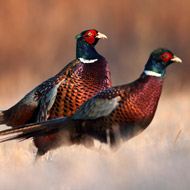Pheasants ‘most likely’ bird to be killed on roads

Captive-bred pheasants “may be at risk” when they are released from pens, as they are raised without parents and “simply lack the opportunity to learn”.
Pheasants are the most likely bird species to be killed on the UK’s roads, according to new research by the Universities of Exeter and Cardiff.
Scientists say pheasants that are captive bred for shooting could be at risk when they are released from their pens, as they have not learned survival skills from their parents.
Simple steps could be taken to reduce the number killed, Dr Joah Madden from the University of Exeter explained. For example, feeding them away from roads and continuing to feed them after the shooting season has ended to stop them wandering onto roads.
The research team compared roadkill figures from a citizen science group, spanning the 1960s and 2010s - before and after the start of mass release programmes of pheasants for shooting.
The research shows this large-scale release of pheasants has not changed their likelihood of being killed, but it has affected the times of year they are killed. Autumn and late winter are now peak times for pheasant roadkill, whereas in the 1960s, it was early summer.
In 1960-61 the UK had an estimated 200,000 to one million pheasants (making up 0.1-0.5 per cent of the country’s breeding birds). Yet an estimated 6.8 per cent of all roadkill birds were pheasants, making them 13 times more likely to die on roads.
By 2011, however, pheasant numbers ranged throughout the year - from 5.6 million (3.6 per cent of breeding birds) in winter, to 28 million (seven per cent) after the breeding season. Roadkill figures showed they were still 5.4 times more likely to be killed on the road in winter, and nearly 12 times more likely after the breeding season.
When their large body size was accounted for, they were 1.3 to 1.6 times more likely to be killed on roads.
Furthermore, figures from 1999-2003 show 65 road accidents a year involved pheasants, of which six per cent led to human deaths or serious injuries.
The two peaks in road deaths coincide with the times of the year when captive-bred pheasants are released from their pens (September to November), and at the end of the shooting season (in February) when they no longer receive supplementary feed.
Dr Madden said pheasants are no longer susceptible during the June to August breeding season, “perhaps because relatively few breed successfully”.
However, captive-bred pheasants “may be at risk” when they are released from pens, he added, as they are raised without parents and “simply lack the opportunity to learn”.
The findings have been published in the journal the Royal Society Open Science.



 The BSAVA has opened submissions for the BSAVA Clinical Research Abstracts 2026.
The BSAVA has opened submissions for the BSAVA Clinical Research Abstracts 2026.